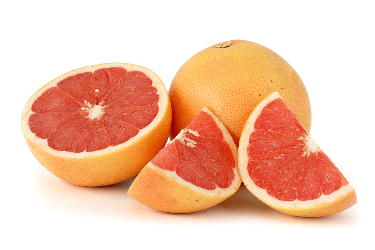Grapefruit is a citrus fruit. People use the fruit, oil from the peel, and extracts from the seed as medicine. Grapefruit seed extract is processed from grapefruit seeds and pulp obtained as a byproduct from grapefruit juice production. Vegetable glycerin is added to the final product to reduce acidity and bitterness.
Contents
Uses
- Grapefruit juice is used for high cholesterol, “hardening of the arteries” (atherosclerosis), cancer, a skin disease called psoriasis, and for weight loss and obesity.
- Grapefruit seed extract is taken by mouth for bacterial, viral, and fungal infections including yeast infections.
- Grapefruit oil is applied to the skin for muscle fatigue, hair growth, toning the skin, and for acne and oily skin. It is also used for the common cold and flu (influenza).
- Grapefruit seed extract is applied to the skin as a facial cleanser, first-aid treatment, remedy for mild skin irritations, and as a vaginal douche for vaginal yeast infections (candidiasis). It is also used as an ear or nasal rinse for preventing and treating infections; as a gargle for sore throats; and a dental rinse for preventing gingivitis and promoting healthy gums; and as a breath freshener.
- Some people inhale grapefruit vapors to help the body retain water, for headache, stress, and depression. Grapefruit seed extract vapor has also been inhaled for the treatment of lung infections.
- In food and beverages, grapefruit is consumed as a fruit, juice, and is used as a flavoring component.
- In manufacturing, grapefruit oil and seed extract are used as a fragrance component in soaps and cosmetics; and as a household cleaner for fruits, vegetables, meats, kitchen surfaces, dishes, etc.
- In agriculture, grapefruit seed extract is used to kill bacteria and fungus, fight mold growth, kill parasites in animal feeds, preserve food and disinfect water.
Benefits
- Grapefruit is a source of vitamin C, fiber, potassium, pectin, and other nutrients. Some components might have antioxidant effects that might help protect cells from damage or reduce cholesterol.
Cautions
- Grapefruit is safe in the amounts normally used as food and seems to be safe when used appropriately for medicinal purposes.
- Pregnancy and breast-feeding: Not enough is known about the use of grapefruit during pregnancy and breast-feeding. Stay on the safe side and avoid use.
- Breast cancer: There is concern about the safety of drinking excessive amounts of grapefruit juice. Some research suggests that postmenopausal women who consume a quart or more of grapefruit juice every day have a 25% to 30% increased chance of developing breast cancer. Grapefruit juice decreases how estrogen is broken down in the body and might increase estrogen levels in the body. More research is needed to confirm these findings. Until more is known, avoid drinking excessive amounts of grapefruit juice, especially if you have breast cancer or are at higher than usual risk for developing breast cancer.
Interactions
It’s important to remember that drug interactions with grapefruit juice are well documented. The chemistry of the grapefruit varies by the species, the growing conditions, and the process used to extract the juice. Before adding grapefruit to your diet or your list of natural medicines, check with your healthcare provider if you take medications.
Major Interaction – Do not take this combination
- Artemether (Artenam, Paluther)
- Buspirone (BuSpar)
- Carbamazepine (Tegretol)
- Carvedilol (Coreg)
- Cisapride (Propulsid)
- Clomipramine (Anafranil)
- Cyclosporine (Neoral, Sandimmune)
- Dextromethorphan (Robitussin DM, and others)
- Estrogens
- Etoposide (VePesid)
- Itraconazole (Sporanox)
- Medications changed by the liver (Cytochrome P450 3A4 (CYP3A4) substrates)
- Medications for high blood pressure (Calcium channel blockers)
- Medications used for lowering cholesterol (Statins)
- Methylprednisolone
- Praziquantel (Biltricide)
- Quinidine
- Scopolamine (Transderm Scop)
- Sedative medications (Benzodiazepines)
- Sildenafil (Viagra)
- Terfenadine (Seldane)
Moderate Interactions – Be cautious with this combination
- Caffeine
- Erythromycin
- Fexofenadine
- Losartan
- Medications changed by the liver (Cytochrome P450 1A2 (CYP1A2) substrates)
- Medications changed by the liver (Cytochrome P450 2C19 (CYP2C19) substrates)
- Medications changed by the liver (Cytochrome P450 2C9 (CYP2C9) substrates)
- Saquinavir (Fortovase, Invirase)
- Theophylline
- Warfarin (Coumadin)
Other Names
Agrume, Bioflavonoid Complex, Bioflavonoid Concentrate, Bioflavonoid Extract, Bioflavonoids, Bioflavonoïdes, Bioflavonoïdes d’Agrumes, Citrus, Citrus Bioflavones, Citrus Bioflavonoid, Citrus Bioflavonoid Extract, Citrus Bioflavonoids, Citrus decumana, Citrus Extract, Citrus Flavones, Citrus Flavonoids, Citrus Grandis Extract, Citrus maxima, Citrus paradisi, Citrus Peel Extract, Citrus Seed Extract, Cold-Pressed Grapefruit Oil, Complexe Bioflavonoïde, Complexe Bioflavonoïde de Pamplemousse, Concentré de Bioflavonoïde, CSE, Expressed Grapefruit Oil, Extrait d’Agrume, Extrait de Bioflavonoïde, Extrait de Bioflavonoïdes d’Agrumes, Extrait de Graines de Pamplemousse, Extrait de Pamplemousse, Extrait de Zeste d’Agrume, Extrait Normalisé de Pamplemousse, Flavonoïdes d’Agrumes, Grapefruit Bioflavonoid Complex, Grapefruit Extract, Grapefruit Oil, Grapefruit Seed Extract, Grapefruit Seed Glycerate, GSE, Huile de Pamplemousse, Huile de Pamplemousse Pressée à Froid, Pamplemousse Rose, Paradisapfel, Pink Grapefruit, Pomelo, Shaddock Oil, Standardized Extract of Grapefruit, Toronja.
References
Source: WebMD, “Grapefruit”, www.webmd.com/vitamins-supplements/

